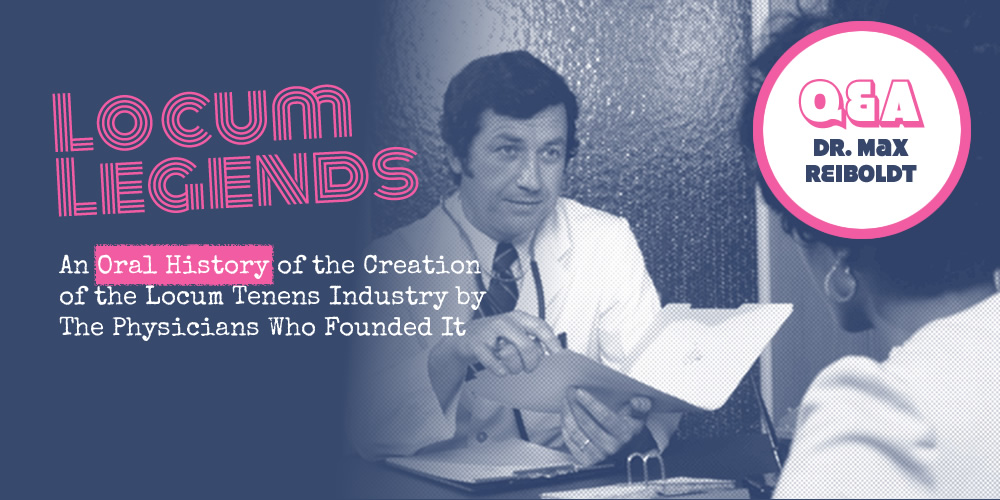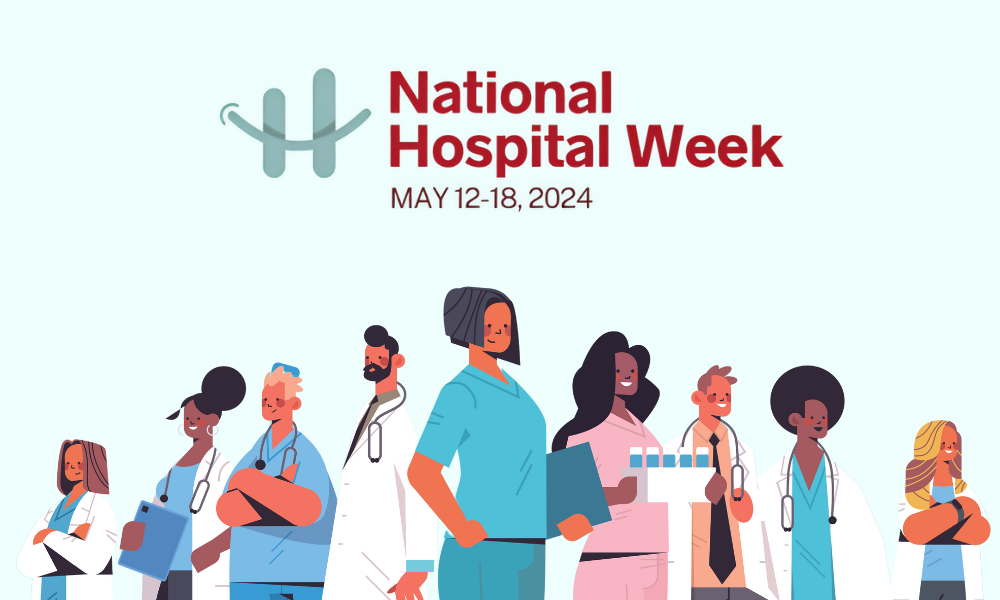As we celebrate National Locum Tenens Week 2023, Locumpedia steps back in time to tell the untold story of how enterprising doctors in the 1970s revolutionized the delivery of healthcare with locum tenens, a $6 billion staffing juggernaut.
These trailblazers played an instrumental role in shaping the industry during its nascent stages. Their unparalleled foresight and resourcefulness revolutionized healthcare staffing, providing an invaluable service to physicians, healthcare facilities, and millions of patients.
In an exclusive Q&A session with Locumpedia, we had the privilege of sitting down with Max Reiboldt, who heads Coker Group, a national healthcare advisory firm.
Reiboldt and the Coker Group work with hospitals and physician groups to develop custom business solutions in strategy, compliance, finance, technology, and operations.
In 1987, Jackson C. Coker, a pivotal figure in the physician recruitment space, established Coker Group as a physician relations firm to improve the relationships between medical staff and the healthcare facilities they serve.
Coker did this by first speaking with healthcare officials to ask them what their biggest problems were and how he could help fix them. What he found led him to transition from recruitment into a space where he could focus more on improving administrative processes. Coker worked with hospital administrators to implement new strategies, manage operations, and enhanced their financial business models.
Reiboldt started his career in public accounting before being introduced to Coker. The connection between the two men was clear from the start, he says. Reiboldt joined the Coker team, working alongside the pivotal figure in temporary staffing history before being handed the reins in 1996.
Reiboldt chats about his relationship with Coker, Coker’s connection with the second-largest locum tenens firm today, and the evolution and growth of the industry.
He explains that Coker Group works closely with healthcare organizations through their consulting and advisory work. He says these health systems use community assessment studies that the Coker Group provides them to inform their recruitment efforts for hospital staff, which often includes locum tenens physicians.
Locumpedia: Please talk about the founding of Coker Group and the impact it has had on the locum tenens industry.
Max Reiboldt: Let me go back almost 40 years. Coker Group was formed in 1987 by Jackson C. Coker, who passed away in 2014. Mr. Coker’s history and experience were originally in physician recruitment. Then there was a partnership with [Rick] Jackson of Jackson Healthcare, and Jackson & Coker, where they specialized in executive recruitment. That has changed to Jackson + Coker Locum Tenens today as a part of Jackson Healthcare, and they still do a lot of locum tenens work.
To be clear, the Coker Group has never been a part of Jackson & Coker and vice versa. We started Coker Group with no intention of doing physician recruitment. We do limited executive search work, mainly for existing clients, and we have relationships with physicians because we conduct interviews with them as part of our community needs assessments and consulting services.
The main thrust of Coker Group is consulting and advisory services. So, how do we touch on recruitment and locums? With our consulting practice, we do a good bit of medical staff planning, everything from supply and demand to community needs assessments. These are studies done so hospitals can look into the future, see certain specialties, and recruit accordingly.
Many times that touches on locums because, many hospitals – some of which are rural community hospitals that can’t recruit as successfully in certain specialties – have to fill in with physicians on a temporary basis. We do a lot of work on what we call “physician enterprises,” which could be employed by physician groups within hospital systems, private groups, and private equity purchase groups. We do a lot of transactional work and compliance work on fair market value, compliance plan work, coding audits, and technology consulting.
We have never been recruiters in that sense and don’t work specifically in locum tenens placement. Our paradigm was not to assist hospitals or groups in the “recruitment of more physicians,” but under our then-work product of “Physician Relations Programs,” we helped our hospital clients to create and complete a much more organized and responsive form of customer service to their independent medical staff member providers.
In turn, the hope is that those providers would refer their patients to that hospital due to its better customer service (with the provider being the customer) and responsiveness.
Locumpedia: Let’s look back at how you got involved with Coker Group and your relationship with Mr. Coker.
MR: Jack was a consummate Southern gentleman from LA. LA, of course, means lower Alabama. [Laughs]
He was very gracious, a consummate professional, and a great salesman. He had the great gift of communication, and he was reputable. He had a presence when he walked into a room. He was a very likable individual and entrepreneurial-minded. He was always thinking about ways he could do things better.
Jack was on the cusp of physician recruitment being much more formalized and organized as a separate business structure from other recruitment initiatives.
Temporary help has always been an ingredient in almost every industry, and indeed, even in our consulting work, we fill C-suite positions on an interim basis, as well. In a way, we have our own kind of locums, if you want to call it that.
I acquired the firm from Jack after about five years of working with him. But we were very good friends and continued to be. We stayed in touch, went to the same church, and built a great relationship. His oldest daughter was a nurse and helped start the firm for Jack. We’re still close to the family.
When I bought the company in 1996-97, I had no desire to change the name. The Coker name still has some great value. We’ve done very well because of it — it’s who we are.
Locumpedia: In your time working in this industry and helping hospitals plan for their future, how have you seen the locums industry evolve?
MR: I have found the ballgame of locums physicians has improved quite a good bit over the years.
There was a time, and this is just my perception, that at times you went out and got locums and had to look the other way because it wasn’t the same quality of physician. That was never to say they weren’t caring for patients or providing quality care, but it wasn’t up to the same high standards. But the locums industry has continued to mature, and it’s my observation the quality of the average locums has improved. It’s a huge part of the physician supply.
Locumpedia: You briefly mentioned the work you do to provide community-needs assessments to help companies plan ways to staff their hospitals for the future. Can you explain what that means and how healthcare systems use this assessment?
MR: Given the long timeframe for hospital recruitment, we help them plan so they can make sure there’s an adequate supply of medical staff specialists. There will inevitably be a time they have a need to fill. This assessment is converted into a statistical study that we complete on behalf of our clients that takes a look at each specialty they offer.
Let’s look at cardiologists, for example, which every hospital would have to have. We would complete a study by looking at the current supply and making sure it fits the hospital’s needs, and how much longer based on the doctor’s age and other variables these cardiologists will practice.
But how all that relates to locums: locums are expensive. Hospitals pay a premium for that interim, temporary assignment work. You can limit that cost by recruiting permanent physicians, and that’s why that coordination would be of great value to the hospital to limit their cost.
Locumpedia: Can you tell us more about how locum tenens plays into a company’s staffing strategy and where you see this industry heading in the future?
MR: Because of our relationship and working with so many health systems that are primary users of locum tenens, we understand why they use them, why they need them, and how they fit in the mix.
Locum tenens is a valuable part of the healthcare delivery system because when hospitals or groups or other entities have an opening for a key position — and even midlevel advanced-practice-type positions — they can’t, generally speaking, wait around for a week or months because the recruitment timeframe can be very long replacing a physician, particularly to a physician requiring relocation, credentialing, and all of that.
The locum business will always be a great need and, frankly, great prominence in terms of many opportunities for locum firms.
Thanks for Reading
This interview is part of our weeklong Locum Legends series published in conjunction with National Locum Tenens Week, which takes place from August 14 to 18, 2023. Each year, during the second full week of August, the locum tenens community celebrates the 50,000+ temporary physicians and advanced practice providers who deliver essential healthcare services across America.








